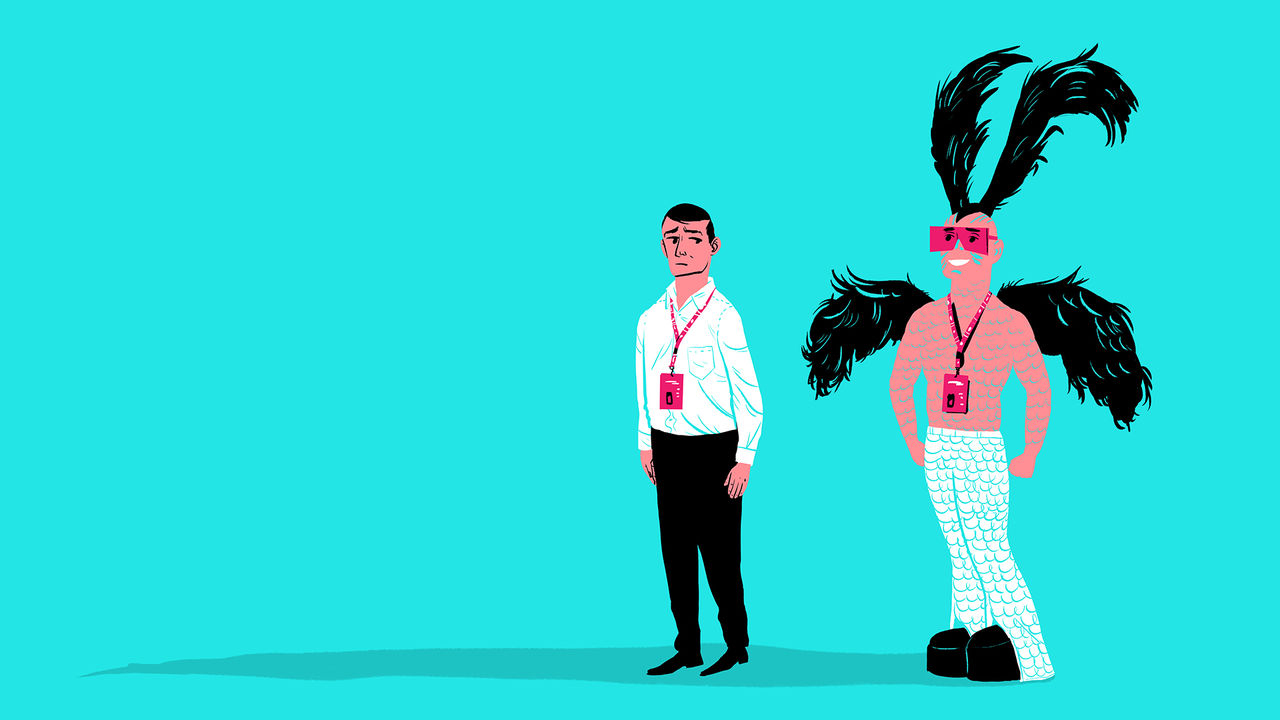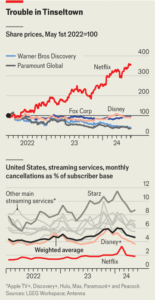
Your browser does not support the <audio> element.
AN EMAIL URGING you to download the “forum-networking app” to start “making new connections” ahead of next week’s “knowledge-sharing experience” reminds you of something you had pushed to the back of your mind: you are going to a conference. If you are a paediatric nephrologist meeting colleagues to discuss the latest in children’s dialysis, a founder looking for investors or a speaker, you know what to do. But if—like most conference attendees, including, on occasion, this guest Bartleby—you are not sure why you are here, you need a strategy.
First, manage your expectations: “convention”, “summit”, “event”, “roadshow” and “festival” sound more fun than a conference, but don’t bring your Glastonbury or Burning Man kit. You are still just going to a gabfest. No need to wear a three-piece suit, and by all means dress for comfort, but avoid the Midwest-account-manager-out-for-a-golf-weekend look. You never know whom you might run into.
Next, remember that all icebreakers are a trick. If you are encouraged to draw something jolly on your name badge or use a “fun” sobriquet, politely resist. Similarly, if you are asked to share something nobody knows about you, this is a trap. Never say anything awkward about your own body or physiology (“I have a third nipple”, “I can burp the alphabet”), or anyone else’s. Avoid the temptation to be a pompous ass: “I was a junior swim champion and once dated Kylie Minogue.” Being memorable means people will expect you to be both present and attentive. Blandness is a good goal.
Pick sessions selectively. Keynote speeches are usually reruns and can be skipped, unless bragging rights are useful in your line of work (“Check out my selfie with Elon”). Panels with more than four talking heads are always pointless. The term “fireside chat” has become wildly misappropriated—unless there is an actual fireplace, you are unlikely to get a cosy, honest conversation. If the breakout “tracks” do not appeal, choose the hallway track: lingering in the corridors and chatting with people too important to be in sessions.
Do turn up every day. But do not expect a prize for being a super-attender. If some form of presenteeism is required—ie, if you are accompanying your boss—apply the “first round” rule: stand up and ask a decent question early in a session, ideally near a photographer. Like getting the first round at the bar, people will remember you well after you have left.
Choose your seat wisely. Too close to the front and you cannot escape a dull session, too near the back and nobody will see you. As in aeroplanes, avoid the middle of rows. Standing in the wings offers maximum flexibility (though it brings the risk of an organiser asking you to sit down once all the good seats have been taken).
Be even more careful about where you eat, and what. For a sit-down meal, be ruthless about your company. A bad dinner will be more tolerable if you nab a spot next to David Attenborough or Michelle Obama. As with all buffets, keep your eye on the full array before you load up on coleslaw. Unless you can smell the sea, avoid the fish. If waiters offer canapés, remember that handling drink and dip is a recipe for disaster. In coffee breaks, avoid anyone flouting the icebreaker rule (if you hear talk of “explosive” anything, move in the opposite direction). Considering happy hour? Ask yourself: are these people really happy?
Still, for most people, the main value of conferences is networking. This usually happens around the refreshment area. So even introverts should not skip all the socials and wine snobs ought to be prepared to drink bad wine for a good cause. Circulate carefully: better to invest in a few targeted conversations than play business-card bingo by skipping from one short chat to the next. Darting your eyes around for a conversation upgrade is rude, and a bit sad.
Done well, a conference is the perfect alibi for getting some much-needed rest, recuperation, maybe even inspiration. Research shows productivity gains from holidays are greatest when people truly disconnect. To maximise the RoC (return on conference), stay offline. Start the day slow, use the hotel gym or pool, take yourself out for a leisurely breakfast. Make the most of being away from the office: go for a walk in a new city and take catnaps between sessions. This is what others do when they say they “have to take a call”. With spirits lifted, and some of the snark shaken off, you might actually get something out of this thing. Oh, and don’t be afraid to leave early. ■
















